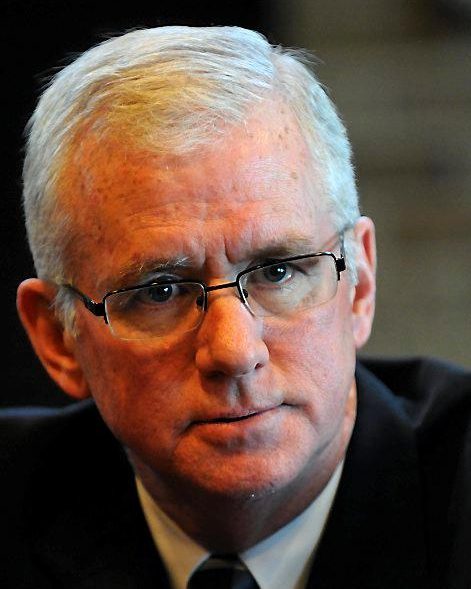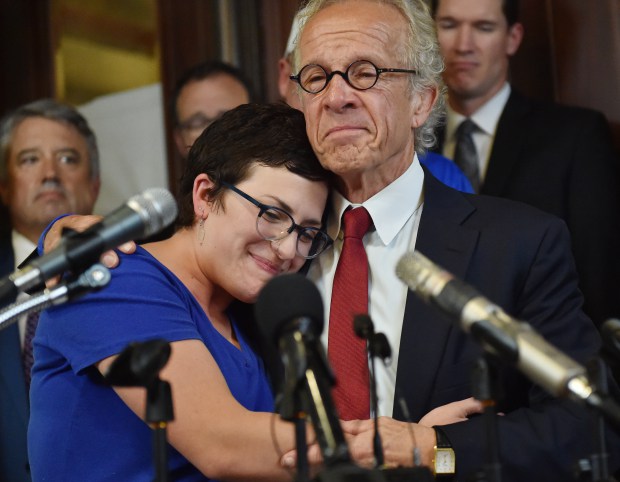‘this Is the Most Meaningful Job I’ve Ever Had,’ Says Top Cop of Twin Cities Archdiocese
By Ruben Rosario
“I said that if they were looking for that kind of church-going Catholic, then I was not the best person for the job,” he said. O’Malley and a 12-member lay staff he assembled that included former Department of Public Safety Commissioner Michael Campion, retired St. Paul homicide detectives and others, encountered a mess of more than 3,300 misconduct files, many of them decades old, that were dated and incomplete. More than 700 files needed extensive investigation and follow-up. They also found a poor in-house system of investigating and acting upon allegations within the Archdiocese of St. Paul and Minneapolis. “There were some mistakes made by people who were in over their heads,” O’Malley explained. “Laity is huge. We are not going to have two guys with collars in a backroom making a decision. It’s not going to be that.” Also significant was the revamping of the archdiocese’s Ministerial Review Board, which looks into clergy misconduct of all types and makes recommendations to the archbishop. Mostly manned by clerics, the board now includes a University of Minnesota medical researcher and child clergy abuse victim, two psychologists, two lawyers and noted missing-children crusader Patty Wetterling. She is the mother of Jacob, an 11-year-old boy whose 1989 abduction became one of the nation’s most well-known and vexing missing child cases until a suspected child abuser confessed two years ago to snatching, sexually abusing and then killing the boy within hours of the kidnapping. How I hate writing what I just wrote. Nearly four years later, O’Malley and others believe they have in place a far more effective and accountable system that seeks to protect children and others from clergy misconduct and hold offenders accountable, whether they commit a crime or violate vows or a code of conduct practices. Part of the impetus is a 2015 court settlement after the Ramsey County attorney’s office filed criminal charges against the church for its failure to protect children. This week a judge found the archdiocese once again in compliance with the terms of that settlement. No doubt the $210 million settlement reached two months ago to compensate hundreds of abuse victims — the largest so far involving a Catholic archdiocese in a bankruptcy proceeding — also helped spur that much-needed change. O’Malley believes things have changed for the better. But as he notes, he’s on the archdiocese’s payroll so whatever he might say may not matter much to skeptics. But I was surprised a bit by what two of the archdiocese’s most outspoken and harshest critics say about O’Malley and the work he and Campion and others have done so far. “The primary difference between Tim and Mike and all the others I wrestled with at the archdiocese is they ARE NOT clerics,” Bob Schwiderski, a former president of the state chapter of Survivors Network of those Abused by Priests and a child clergy sex abuse survivor, wrote in an email. “I found O’Malley to be a man of his word, a person I found I could trust.” And this from St. Paul attorney Jeff Anderson, whose crusader-type legal advocacy on behalf of clergy-abuse victims locally and nationally may have played the most significant role in effecting change.
“This is the cleanest archdiocese right now in the country,” Anderson told me recently. “I’ve known both O’Malley and Campion and their work and I agree their role in the cleanup so far has been important and significant.” Did hell just freeze over? Maybe not quite. But Anderson’s take is eyebrow-raising noteworthy. Nienstedt resigned under a cloud nine months after O’Malley took the job. He was tight-lipped about Nienstedt. But not so much when I asked him about his current boss, Bernard Hebda, Nienstedt’s successor. “The one I’m working for now is one of the most genuine guys I’ve ever met,” O’Malley told me. “He’s very learned … he’s very humble. He’s not into rituals. He’s seldom the loudest voice in the room but he’s a hell of a leader. We would not be where we are today without him. He’s kind of a ‘Columbo’ kind of guy.” I presume he was referring to the TV detective played by the late Peter Falk and not a member of the Colombos, one of five notorious organized crime families in New York City. But who am I to judge? Here’s some of what O’Malley and I talked about, edited for clarity and brevity: Q: What did you say to the archbishop in how you would approach your work? A: I will always be honest with you and I will be loyal to the extent that I’m involved in a decision as long as that decision is not immoral, unethical or illegal. I’m not going to go into anything with my mind going in a certain direction. Wherever the facts take us, they take us. If they take us to a bishop or vicar general, they take us to a bishop or vicar general. They may take us to a priest that did not do it. There’s a very small percentage that did not, but there have been a couple. I’ve said to them, if you did this, I’m going to be your worst enemy. I think you should be in prison. Now if you did not do this, and this is false, I will do my best to prove that, too. Q: How much of the workload are old misconduct cases? A: Upper 90 percent is old stuff. We’ve only had a few — (Mark) Huberty was an example (Huberty, a church pastor in Maplewood, was charged and tried in 2014 for allegedly starting a sexual relationship with a married woman he had been counseling. He was acquitted but Pope Francis ordered him removed from the priesthood last year). It not a question of whether there was sexual interaction. The question was whether it was a counseling situation, which, if it was, was a crime. It went to trial. He was acquitted. The jury basically said, no, these were two consenting adults having sex. That he happened to be a priest wasn’t the government’s concern. But was he the church’s concern? Yes. And he’s not a priest today. Q: Is Patty Wetterling still involved? A: Yes. We had two priests convicted of child molestation come into the MRB one time to tell their stories. Patty was there. One of them involved a boy of Jacob’s age. I asked her if she wanted to leave, she could opt out. She said no and sat through the whole thing and later thanked them for coming in. I asked her how she could sit there and she told me that she tries to be more analytical in these settings. She had two observations at the end. One is, this offender has something to offer today. How can we take advantage of that? And the second thing is that she thinks hard about what happened to him and at what age that made him do that? Q: What’s been the most challenging aspect of the work? A: Personally, it’s working with the victim/survivors. I think you and I share some experiences dealing with people in pretty emotional situations. I don’t want to make it sound too melodramatic. I mean I’ve sat with parents on the day their children were murdered. My point is that in meeting with the survivors I know now that there were a few altar boys in my parish who were abused. I looked up the priests who were in my parish through bishop-accountability.org. I don’t know which kids. But I have to believe it. Never happened but to me but this is one of those but for the grace of God. Has that been the most challenging? Yes. Has it been the most rewarding? Yes. There are about a dozen that I maintain regular contact with. And it’s motivating. I realize how fortunate I am. Q: There’s a perception that with the settlement, the work and your work is now done. A: The goals continue to be to err on the side of protecting children and to help establish trust and confidence in the church once again. There are some victims who have come in and said I will never, ever trust. I tell them, listen, I’m not here to convince you. I cannot undo what’s happened. I’m trying to make the best of what we have and move forward so it does not happen again. One way is embedding what we have in place now — virtues training, background checks and the policy code of conduct stuff — so that 20 years from now, it’s part of life. This is the most meaningful job I’ve ever had.
|
.
Any original material on these pages is copyright © BishopAccountability.org 2004. Reproduce freely with attribution.

